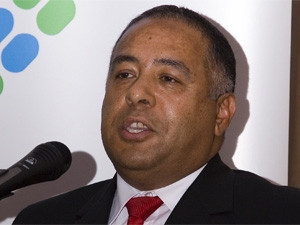
In the five years since Telkom unbundled its 50% stake in Vodacom - which it did in a bid to be more competitive as it could not expand in Africa - it has seen revenue from its traditional operations fall, its share price plummet, and billons lost in dividends.
Vodacom recently published its annual results and said it was returning R11.7 billion to shareholders in the form of dividends. This takes its dividend pay-out since being listed to R33.3 billion, of which R16.65 billion would have gone to Telkom.
SA's largest cellphone company reported group revenue up 4.5%, to R70 billion, while service revenue only gained 2.9% - stripping out currency fluctuations - to R59 billion. In 2009, Telkom's share of Vodacom's turnover was R27.6 billion, while continuing operating revenue - excluding Vodacom - came in at R35.9 billion.
Telkom is set to report its annual results on 14 June, but has already warned that headline earnings per share, a key measure of profitability, will be lower.
Taking strain
Last year, Telkom reported a profit from continuing operations of R179 million in the year to March, off flat operating revenue of R33 billion. However, it made a loss from discontinued operations of R269 million, leading to an overall loss of R90 million, compared with the R1.3 billion profit in 2011. Headline profit is R1.7 billion.
Telkom's shares lost ground just after the market opened, dropping to R20.11, after losing 2.76% ? or 57c - on the opening price. Currently, Telkom is trading at an all-time low of R12.84, a steep fall from its highs of more than R90 in September 2007, when Vodacom still contributed to its revenue.
Telkom listed on the JSE in March 2003, with an opening value of R28. The company's share price has been hit by its results to March 2012; trading updates; the resignation of its previous CEO, Nombulelo "Pinky" Moholi; and a R449 million Competition Tribunal fine, which it recently agreed to pay, after initially deciding to appeal.
Shares in Telkom started losing more ground last June, after government binned a proposed offer from Korea-based KT Corporation that would have seen Telkom issue 20% more shares in return for a R3.3 billion injection.
Vodacom, by comparison, is trading at R112, and has a market capitalisation of R166.7 billion, while Telkom's worth on the market is R6.7 billion. Vodacom listed on 18 May 2009, at an opening price of R59, after Telkom agreed to sell 15% to Vodafone, and unbundled the remaining 35% of its stake.
The listing was, however, not without pain, as there was a last-ditch attempt by the Independent Communications Authority of SA (ICASA) and trade union federation Cosatu to sink what was termed the largest listing on the JSE in years.
ICASA and the union launched an urgent application to the North Gauteng High Court at the weekend leading up to the listing, following ICASA's last-minute decision to reverse its approval of a Vodafone takeover.
Mobile freedom?
In Telkom's 2009 annual report, the last year in which Vodacom is included, it said it reaped an "excellent" amount of R22.5 billion for the sale of 15% to Vodafone, and was able to pay a special dividend of R19 a share to shareholders. The report states the conclusion of the Vodacom transaction gives Telkom the "freedom to compete".
At the time, it said the move would allow it to "enter the South African mobile market and provide fully converged services. Telkom is now a smaller company, which allows us to put more focus on our key growth areas."
Then CEO Reuben September said "we are now poised to compete more aggressively in the telecommunications market. Our defend and grow strategies are on track and, following our restructuring, we are better placed to manage our resources more effectively and efficiently."
However, it was not until October 2010 that Telkom launched its mobile offering, branding it 8ta. The arm, while turning over money, has been running at an earnings before interest, tax, depreciation and amortisation loss, which amounted to R2.4 billion last year.
In the financial year that has just ended, Telkom had expected to trim this by 20%, it said a year ago. Operating losses are expected, as the mobile arm is in start-up phase, which is capital-intensive.
Share